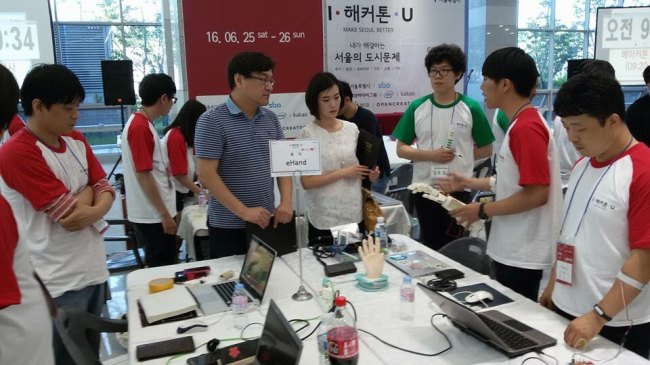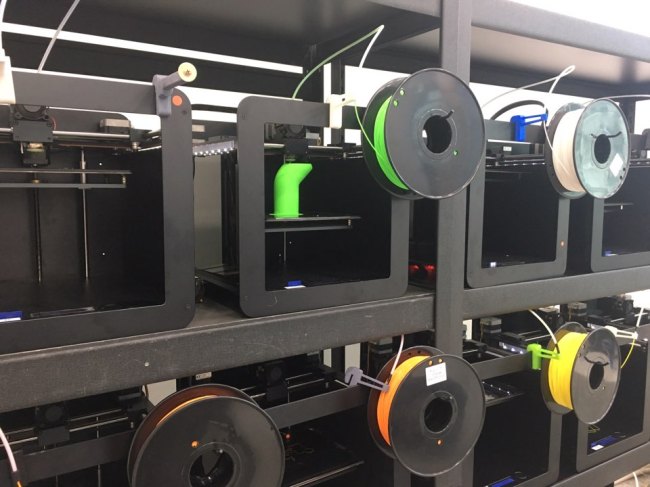[METRO] Hackathon shows how technology can solve urban issues
By Kim Da-solPublished : June 29, 2016 - 17:42
In a recent hackathon organized by Seoul City, 21-year-old Kim Do-kyoon, was one of those in charge of demonstrating how 3-D printers work.
“I have never seen this many 3-D printers together in one place in my life. Maybe this could be an unprecedented scene in Seoul,” Kim told The Korea Herald as he participated in the event last weekend.
“There are so many advantages of using 3-D printers especially at this kind of hackathon event, to create test products more articulate compared to ones made with glue and paper,” added Kim, who appeared excited.
The event took place in S-Plex Center in northwestern Sangam-dong in Seoul and featured about 100 3-D printers.
“I have never seen this many 3-D printers together in one place in my life. Maybe this could be an unprecedented scene in Seoul,” Kim told The Korea Herald as he participated in the event last weekend.
“There are so many advantages of using 3-D printers especially at this kind of hackathon event, to create test products more articulate compared to ones made with glue and paper,” added Kim, who appeared excited.
The event took place in S-Plex Center in northwestern Sangam-dong in Seoul and featured about 100 3-D printers.

Under the theme “Make Seoul Better,” the 30-hour hackathon hosted by the Seoul Metropolitan Government was attended by some 100 teams, who vied to find solutions and create business models to solve urban issues in Seoul.
Kim, a sophomore student at Gachon University’s IT college, heads the one-man startup Lapis, which manufactures and distributes 3-D printer components. He participated in the hackathon as a mentor for 3-D printing and modeling.
Among the prototypes produced by 3-D printers included a box that contained motion-detecting sensors to be installed at the doorsteps of houses and a plastic installation stand for commuters to be able to swipe their traffic cards before getting on buses.
Kim, a sophomore student at Gachon University’s IT college, heads the one-man startup Lapis, which manufactures and distributes 3-D printer components. He participated in the hackathon as a mentor for 3-D printing and modeling.
Among the prototypes produced by 3-D printers included a box that contained motion-detecting sensors to be installed at the doorsteps of houses and a plastic installation stand for commuters to be able to swipe their traffic cards before getting on buses.

A hackathon -- a word that combines “hack” and “marathon” -- is an event where computer programmers and software developers come together for intensive discussions and projects.
On Saturday, each team was given tasks such as making prototypes and suggesting practical products or new services based on technology. These were related to issues in Seoul across topics such as welfare, environment, tourism, health and transportation.
Many teams presented their ideas with products made from the 3-D printers.
The Seoul Metropolitan Government said that the event worked as an opportunity to explore technological proposals involving innovative products, policies and programs.
Industry experts and judges from various fields also participated to support the teams that were made up of college students and start-up members.
“There are a lot of great thinking and global opportunities in Korea,” Arnold Chung, a professor of International Business from Kookmin University told The Korea Herald. He participated at the event as one of the judges.
Professor Chung added that hackathon events would continue to expand in Korea and will grow to cover life sciences, biomedical science and agriculture.
The top prize was awarded to a team comprised of foreign students from Sungkyunkwan University for their creation of a water saving system that involved installing a washstand on top of public urinals.
The Seoul Metropolitan Government said the city government will provide the award-winning 15 teams with up to 1.3 million won ($1,118) to authorize their patents, in addition to covering 200 million won of research and development cost.
The City added that they will also support them in proceeding with patent registration and business set-ups.
“I am very impressed by the passion that participants showed for today’s event,” said Mayor Park Won-soon while walking around the tables of participants who were adding the finishing touches to their prototypes before the presentation. “We hope to continuously find answers to urban issues through citizens’ participation and seek ways to turn them into real business models,” he added.
Sun Hahm, one of the participants of team Pedegraph from the U.S. said having showed their idea and business model at a hackathon was “just a beginning.”
“(Although our team was not given an award) we are going to continue working on our project and work on our flaws based on the feedback we got today,” Hahm said. His team had presented an idea to have motion sensors installed around crowded crossroads -- such as those in Gangnam -- so they can detect traffic flows on a real-time basis and send data to a mobile application that allows users to avoid possible traffic or empty paths at night.
Joo Hyoung-cheol from Seoul Business Agency under the Seoul City said that they have witnessed how gatherings like this can provide creative solutions for urban issues through technology.
“We also saw possibilities of bright ideas from foreign teams, which we think we will attract more business models and ideas from outside Korea,” he said.
By Kim Da-sol (ddd@heraldcorp.com)
On Saturday, each team was given tasks such as making prototypes and suggesting practical products or new services based on technology. These were related to issues in Seoul across topics such as welfare, environment, tourism, health and transportation.
Many teams presented their ideas with products made from the 3-D printers.
The Seoul Metropolitan Government said that the event worked as an opportunity to explore technological proposals involving innovative products, policies and programs.
Industry experts and judges from various fields also participated to support the teams that were made up of college students and start-up members.
“There are a lot of great thinking and global opportunities in Korea,” Arnold Chung, a professor of International Business from Kookmin University told The Korea Herald. He participated at the event as one of the judges.
Professor Chung added that hackathon events would continue to expand in Korea and will grow to cover life sciences, biomedical science and agriculture.
The top prize was awarded to a team comprised of foreign students from Sungkyunkwan University for their creation of a water saving system that involved installing a washstand on top of public urinals.
The Seoul Metropolitan Government said the city government will provide the award-winning 15 teams with up to 1.3 million won ($1,118) to authorize their patents, in addition to covering 200 million won of research and development cost.
The City added that they will also support them in proceeding with patent registration and business set-ups.
“I am very impressed by the passion that participants showed for today’s event,” said Mayor Park Won-soon while walking around the tables of participants who were adding the finishing touches to their prototypes before the presentation. “We hope to continuously find answers to urban issues through citizens’ participation and seek ways to turn them into real business models,” he added.
Sun Hahm, one of the participants of team Pedegraph from the U.S. said having showed their idea and business model at a hackathon was “just a beginning.”
“(Although our team was not given an award) we are going to continue working on our project and work on our flaws based on the feedback we got today,” Hahm said. His team had presented an idea to have motion sensors installed around crowded crossroads -- such as those in Gangnam -- so they can detect traffic flows on a real-time basis and send data to a mobile application that allows users to avoid possible traffic or empty paths at night.
Joo Hyoung-cheol from Seoul Business Agency under the Seoul City said that they have witnessed how gatherings like this can provide creative solutions for urban issues through technology.
“We also saw possibilities of bright ideas from foreign teams, which we think we will attract more business models and ideas from outside Korea,” he said.
By Kim Da-sol (ddd@heraldcorp.com)


![[AtoZ into Korean mind] Humor in Korea: Navigating the line between what's funny and not](http://res.heraldm.com/phpwas/restmb_idxmake.php?idx=644&simg=/content/image/2024/04/22/20240422050642_0.jpg&u=)

![[Exclusive] Korean military set to ban iPhones over 'security' concerns](http://res.heraldm.com/phpwas/restmb_idxmake.php?idx=644&simg=/content/image/2024/04/23/20240423050599_0.jpg&u=20240423183955)

![[Herald Interview] Why Toss invited hackers to penetrate its system](http://res.heraldm.com/phpwas/restmb_idxmake.php?idx=644&simg=/content/image/2024/04/22/20240422050569_0.jpg&u=20240422150649)
![[Graphic News] 77% of young Koreans still financially dependent](http://res.heraldm.com/phpwas/restmb_idxmake.php?idx=644&simg=/content/image/2024/04/22/20240422050762_0.gif&u=)







![[Exclusive] Korean military to ban iPhones over security issues](http://res.heraldm.com/phpwas/restmb_idxmake.php?idx=652&simg=/content/image/2024/04/23/20240423050599_0.jpg&u=20240423183955)



![[Today’s K-pop] Ateez confirms US tour details](http://res.heraldm.com/phpwas/restmb_idxmake.php?idx=642&simg=/content/image/2024/04/23/20240423050700_0.jpg&u=)